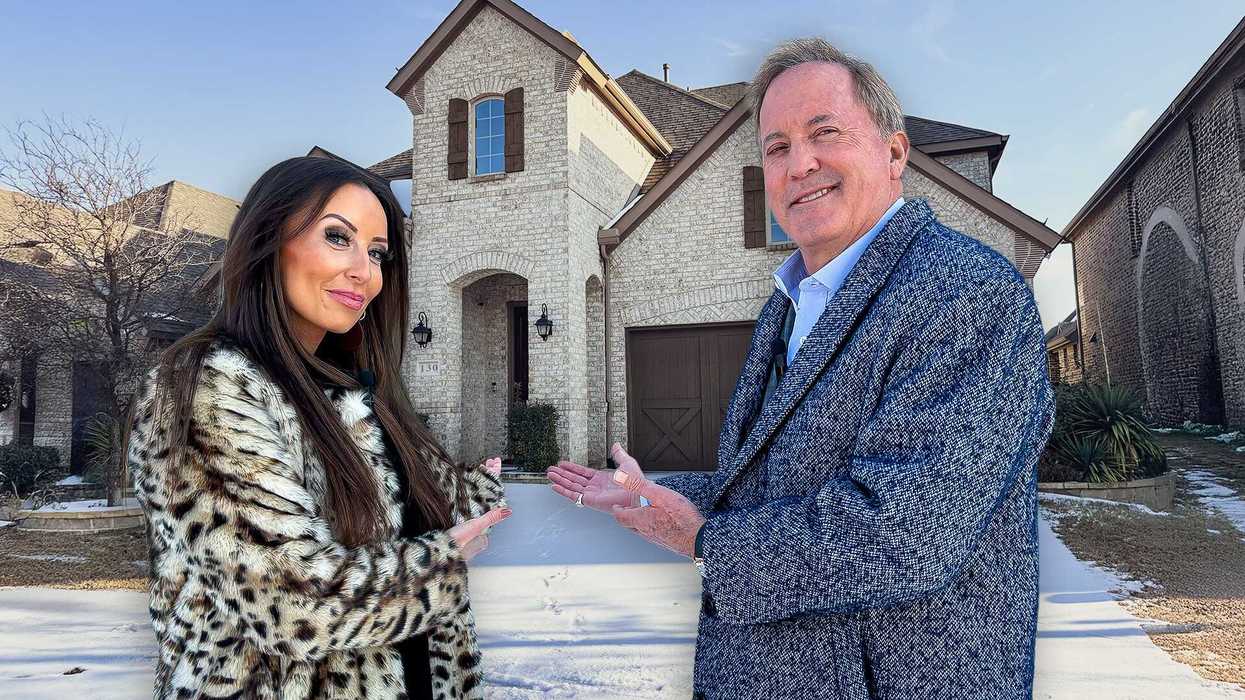
© 2026 Blaze Media LLC. All rights reserved.
Blaze Exclusive: Prominent Atheist Activist Answers Your Most Burning Questions About Faith & Secularism
June 08, 2012
"...why bother living if you could just die and go to heaven?"

Recently, The Blaze invited you to ask your most burning questions of Todd Stiefel, the millionaire atheist who is actively engaged in the secular activist movement. Over the past month, we've received hundreds of comments and interesting queries from a multitude of readers who wish to better understand atheism and the work that Stiefel's so diligently involved in.
This is the first portion of our three-part "Ask an Atheist" series -- a set of articles that will provide insight into Stiefel's activism and worldview. With non-believers organizing like never before in search for political and social recognition, grasping and better understanding secularists' goals is paramount. So, The Blaze has been working with Stiefel to bring you answers to some of the most controversial and contentious subjects surrounding personal faith and religion (read the extensive profile we wrote on the well-known atheist leader earlier this year).
Among the queries that were posed by Blaze readers, some wondered if there was a time in Stiefel's life during which he sought after God and looked for answers in religion. While he admits that he did, indeed, feel close to God at one point, he now believes that Catholicism, among all other faiths, is a false doctrine. Here is the famed atheist's full answer:
"I would not say I ever sought after God, but I found a strong belief at points nonetheless. I chose to go to a Catholic high school and went on several of the religious retreats. This was not to find God, it was because it sounded like a fun way to hang out with my friends. The retreat my senior year was the most religious experience of my life. I really felt close to God, like I was being touched by the Holy Spirit or the like, but in hindsight that is not surprising.In a college psychology class, I learned about the tools used to make people more susceptible to persuasion. I was immediately struck with how similar they were to my experience at the religious retreat in high school. At the retreat, they dramatically underfed us, they kept us up late and woke us early, they used peer pressure to get us to publicly reveal our most painful emotional memories and then talked about God to soothe us. They replaced the pain with God and it worked -- for awhile.
During college, I went through a journey of questioning the faith I had been raised in and realized it was just like all of the other religions. Catholicism is one of several modern remnants of an ancient Middle Eastern pagan religion. It claims to be monotheistic, yet actively promotes belief in other supernatural deity-like beings, such as Satan. I realized it was filled with contradictions and inconsistencies that demanded suspension of disbelief to get past, just like other religions. Just like other faiths, it claims to be the only truth and that all other religions are false. I eventually came to realize that Catholicism was just as true as all other religions, that is to say, it is not."

For religious people, these comments may be hard to swallow, specifically considering those who continue to feel close to God and who cannot relate to Stiefel's assessment. Also, many Christians revere faith as the basis on which their lives are hinged. For the atheist, though, this is obviously not a factor. Another Blaze reader asked, "If atheists have no faith, what is your reason for life?" Stiefel's response is intriguing:
"This questions needs to be broken in two. There is the question of 'what is your reason for life,' but an answer also needs to be given to the assumption of 'atheists have no faith.' To the piece on faith, this depends on what definition of faith you use. If defined as, believing without proof, atheists reject this type of blind faith as dangerous and ignorant. This is the kind kind of faith that allows people to be convinced they will be rewarded with virgins for flying a plane into a building. On the other hand, all atheists have faith in terms of trusting other people. Atheists do not have faith in terms of, believing in gods, but personally I have no problem with people who have this kind of faith so long as they are not fundamentalists and do not try to use the government to spread or legislate their religion.As to our reason for living, our reasons are even stronger than for those who believe in an afterlife. To atheists, we get one shot, there is no reincarnation or heaven where we get to live on after death. We have to do our best here and now. There is no reason for life, except for the purpose we give it. I am sure each atheist has different reasons they love life, but for me, my reasons for living include the joy of raising my children, the love of being with my family and friends and the fulfillment I get from helping other people. A better question may be what is the reason for living for someone who believes in heaven; why bother living if you could just die and go to heaven? What meaning can you give to this life? My guess is that the answers a religious person has to those questions are very similar to the answer I have for living."

When it comes to Stiefel's non-belief, some readers also wondered how it's possible for atheists to look at the world and the universe around them and to not see "something greater than mere chance happenings that created everything around us." The activist explained why he -- and other secularists -- do not see an Almighty figure as the universe's architect:
"I have looked around and do not see something or someone that created everything around us. You have not either. None of us have seen a creator deity. Many people believe there is one (or several), but none of us have seen one. What I want to know is, how can someone look at the massive universe and assume that it was created by Yahweh, one of many desert gods worshiped by primitive people in a tiny corner of one planet orbiting one of the 70,000,000,000,000,000,000,000 stars in the universe? The answer is that people believe the creator is whatever god they were taught as a child is the creator. Virtually nobody with Jewish parents grow up to believe Brahma is the creator. Jewish children are even less likely to believe the creator is one of the gods taught by parents on planets in other galaxies.That said, I don't believe that what exists around me is the result of only mere chance, though chance was a factor. I accept that our solar system is the result of gravity pulling a gas cloud together to form a star, planets and other objects over the course of billions of years. I understand this process was dictated by the laws of physics, just as everything around us is the result of the processes dictated by the nonrandom laws of nature. The evidence demonstrates that there was a Big Bang around 13.75 billion years ago. At this point, it is impossible to know what existed before the Big Bang because the evidence was destroyed in the explosion. Some insist that they are certain that their god existed before then. I find it interesting that some people have such conviction about something that is unknowable."
Among the most common criticisms of atheists in America is their seemingly fervent focus upon Christianity. It's not uncommon for believers to wonder why secularists seem so focused on Christians and not Muslims -- particularly radicalized Islamists. Thus, it's not surprising that a question that popped up quite a bit for Stiefel was, "Why don’t American atheists question radical Islam as much as they do Christianity?"
Stiefel believes that the assumption underlying this question is inaccurate and he seeks to debunk the sentiment with his answer:
"Atheists are very vocal in their criticism of radical Islam. If you do not think we are, then you have not read much of our literature. We do not pull any punches about the evils of fundamentalist Islam (or the falsehood of moderate Islam). The perception that we are less critical of Islam comes from several things. First, there is a natural bias to notice criticism of ones own religion more than the criticism of other faiths. This helps explain why it is more noticeable to Christians when we criticize flaws in Christianity.Second, according to the 2008 American Religious Identification Survey, 76% of Americans identify as Christian, while only 0.6% as Muslim. Given that there are more than 100 times more Christians in this country than Muslims, Christians are a far more influential and powerful group. The things that American atheists criticize (such as violations of separation of church/state, discrimination against atheists, deaths from faith healing, etc.) are problems all over the world, but in this country, those problems are mostly caused by radical Christians, not the relatively powerless Muslims."

When it comes to his own personal activism and his allocation of millions to secularists causes, another question that was asked was "Why would you spend your time and money trying to eradicate something you believe is a myth when the myth gives people comfort and causes them to treat each other with love and respect?"
Stiefel made it clear that he has no intentions of eradicating religion, but that his focus is the separation of church and state:
"I am not spending my money trying to eradicate religion. That would be an impossible goal. I am spending my money to improve the separation of religion from government, eliminate discrimination against atheists/agnostics, rally freethinkers to raise money for charity, and make the world a safer place by undermining the type of fundamentalist religion that leads to war/jihad and terrorism."
The last question in this first part of the series also focuses upon monies, but rather than Stiefel's own fortune, it involves the use of taxpayer dollars on the behalf of anti-theist groups who often make use of the courts. Another reader asked, "How do atheists justify their use of taxpayer dollars (through litigation and court costs) to try and force upon a predominately Christian people their unbelief?"
"The author of this questions seems to be confusing religious right tactics with atheist ones. In what way are atheists trying to force our unbelief on people? Trying to stop the religious right from using the government as a tool to promote religion is not the same as using the government to try to promote unbelief. We do not want the government promoting religion or atheism; we want the government to be neutral on the issue.When we try to stop to the government from telling us how, when, where and what to pray, such as on the National Day of Prayer, that does not promote atheism, it simply opposes government intrusion into religion. Promoting atheism would be us asking the government to issue proclamations telling people not to pray. If the government were to issue such a proclamation, I would be right there with you fighting against it."
This was the first installation of "Ask an Atheist Activist." The next series of questions and answers with Stiefel will be published next Friday.
Want to leave a tip?
We answer to you. Help keep our content free of advertisers and big tech censorship by leaving a tip today.
Want to join the conversation?
Already a subscriber?
Billy Hallowell is a digital TV host and interviewer for Faithwire and CBN News and the co-host of CBN’s "Quick Start Podcast."
Billy Hallowell
Billy Hallowell is a digital TV host and interviewer for Faithwire and CBN News and the co-host of CBN’s "Quick Start Podcast."
more stories
Sign up for the Blaze newsletter
By signing up, you agree to our Privacy Policy and Terms of Use, and agree to receive content that may sometimes include advertisements. You may opt out at any time.
Related Content
© 2026 Blaze Media LLC. All rights reserved.
Get the stories that matter most delivered directly to your inbox.
By signing up, you agree to our Privacy Policy and Terms of Use, and agree to receive content that may sometimes include advertisements. You may opt out at any time.






